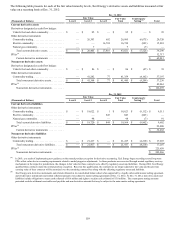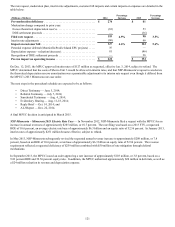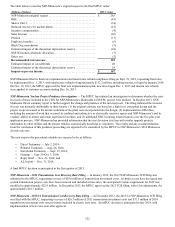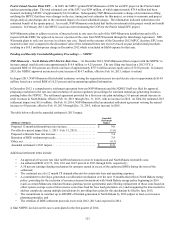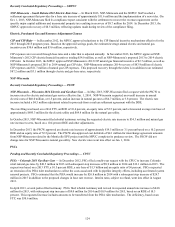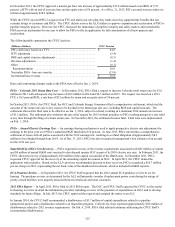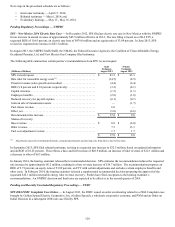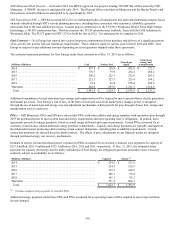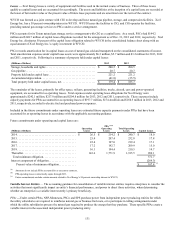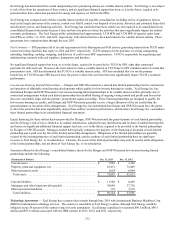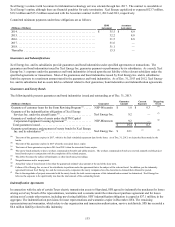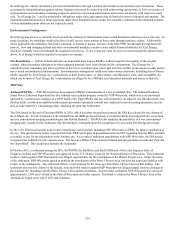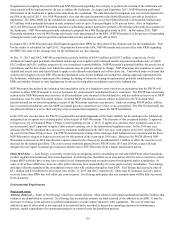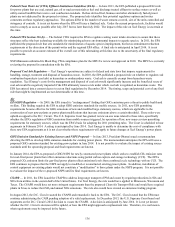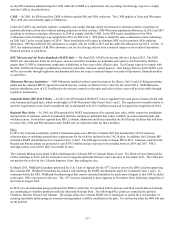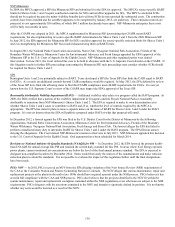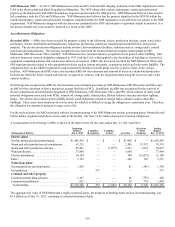Xcel Energy 2013 Annual Report Download - page 147
Download and view the complete annual report
Please find page 147 of the 2013 Xcel Energy annual report below. You can navigate through the pages in the report by either clicking on the pages listed below, or by using the keyword search tool below to find specific information within the annual report.129
The original Complaint included two key components: 1) PNM’s claim regarding inappropriate allocation of fuel costs and 2) a base
rate complaint, including the appropriate demand-related cost allocator. The FERC previously determined that the allocation of fuel
costs and the demand-related cost allocator utilized by SPS was appropriate.
In the August 2013 Orders, the FERC clarified its previous ruling on the allocation of fuel costs and reaffirmed that the refunds in
question should only apply to firm requirements customers and not PNM’s contractual load. The FERC also reversed its prior
demand-related cost allocator decision. The FERC stated that it had erred in its initial analysis and concluded that the SPS system was
a 3CP rather than a 12CP system.
The pre-tax impact to 2013 earnings from these orders is approximately $36 million. Pending the timing and resolution of this matter,
the annual impact to revenues through 2014 could be up to $6 million and decreasing to $4 million on June 1, 2015.
In September 2013, SPS filed a request for rehearing of the FERC ruling on the CP allocation and refund decisions. SPS asserted that
the FERC applied an improper burden of proof and that precedent did not support retroactive refunds. PNM also requested rehearing
of the FERC decision not to reverse its prior ruling.
In October 2013, the FERC issued orders further considering the requests for rehearing. These matters are currently pending the
FERC’s action. If unsuccessful in its rehearing request, SPS will have the opportunity to file rate cases with the FERC and its retail
jurisdictions seeking to change all customers to a 3CP allocation method.
SPS Wholesale Rate Complaint — In April 2012, Golden Spread filed a rate complaint alleging that the base ROE included in the
SPS production formula rate of 10.25 percent, and the SPS transmission base formula rate ROE of 10.77 percent, are unjust and
unreasonable. Golden Spread alleged that the appropriate base ROE is 9.15 percent, or an annual difference of approximately $3.3
million. An additional 50 basis point incentive is added to the base ROE for the transmission formula rate for SPS’ participation in the
SPP RTO. Golden Spread is not contesting this transmission incentive. The FERC has taken no action on this complaint. If granted,
the complaint could reduce SPS revenues approximately $3.1 million per year prospectively from the effective date established by the
FERC.
Sale of Texas Transmission Assets — In March 2013, SPS reached an agreement to sell certain segments of SPS’ transmission lines
and two related substations to Sharyland. In 2013, SPS received all necessary regulatory approvals for the transaction. On Dec. 30,
2013, SPS received $37.1 million and recognized a pre-tax gain of $13.6 million. The gain is reflected in the consolidated statement
of income as a reduction to O&M expenses. Regulatory liabilities were recorded for jurisdictional gain sharing of $7.2 million.
13. Commitments and Contingencies
Commitments
Capital Commitments — Xcel Energy has made commitments in connection with a portion of its projected capital expenditures. Xcel
Energy’s capital commitments primarily relate to the following major projects:
Southeast New Mexico Transmission Development — SPS is developing a transmission expansion plan for southeastern New Mexico.
The SPP, with input from SPS, is conducting a High Priority Incremental Load Study to review oil and natural gas load additions in
several areas, including southeastern New Mexico. A final report is expected by SPP in April 2014. SPS has started right-of-way
work on four projects for which NTCs are anticipated from SPP in early 2014.
CapX2020 — CapX2020 is an alliance of electric cooperatives, municipals and investor-owned utilities in the upper Midwest,
including the NSP System that has proposed several groups of transmission projects to be completed by 2020. Group 1 project
investments consist of four transmission lines. Major construction began in 2010 on the Group 1 transmission lines with an expected
completion date in 2015. NSP System’s investment depends on the routes and configurations approved by affected state commissions
and on the allocation of costs borne by other participating utilities in the upper Midwest.
CACJA — The CACJA required PSCo to file a plan to reduce annual emissions of NOx by at least 70 to 80 percent or greater from
2008 levels by 2017 from its coal fired generation resources. In September 2012, the EPA formally approved the Colorado SIP for
regional haze, including resource planning changes that include early coal-fueled plant retirements, fuel switching and SCR
installation.
PSCo Gas Transmission Integrity Management Programs – PSCo is proactively identifying and addressing the safety and reliability of
natural gas transmission pipelines. The pipeline integrity efforts include system renewal projects and increased maintenance.


